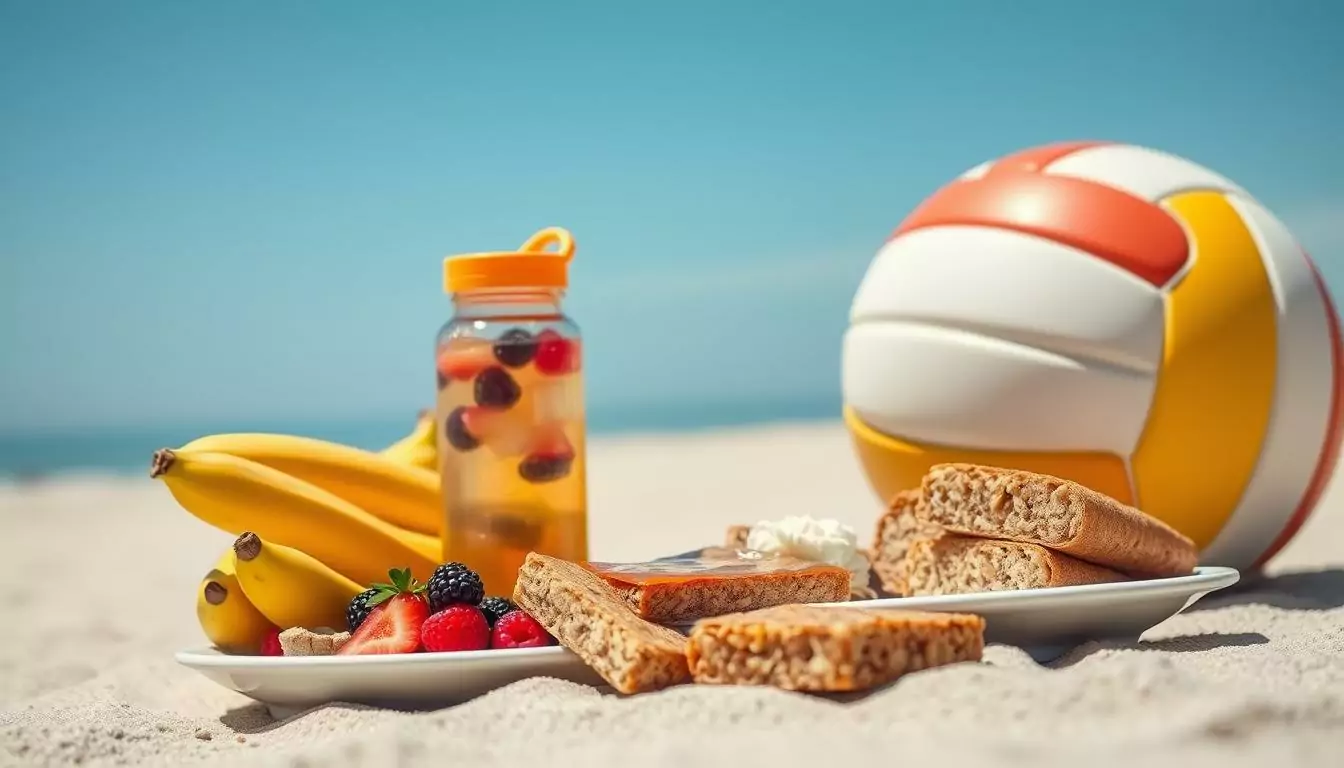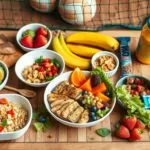Did you know volleyball players need to drink at least half their body weight in water each day? Staying hydrated is key for top performance. The right nutrition boosts energy and helps muscles recover.
I’m excited to share top nutrition tips for volleyball. These tips can help you play better, whether you’re experienced or new. We’ll cover the importance of macronutrients, staying hydrated, and how to fuel up before and after games.
Key Takeaways
- Proper hydration is essential for volleyball players, with a goal of consuming at least half their body weight in ounces of water daily.
- Consuming protein within 30 minutes to two hours after exercise can enhance muscle recovery and growth, vital for volleyball players.
- Foods high in healthy fats, such as avocados, nuts, seeds, and olive oil, contribute to sustained energy levels, critical for long tournaments.
- A balanced meal with complex carbohydrates, lean protein, and a small amount of healthy fat 3-4 hours before a match can optimize performance.
- Consulting a sports nutritionist can provide personalized nutrition plans to meet the specific needs and goals of young volleyball players.
Understanding the Importance of Nutrition in Volleyball

Nutrition is key for volleyball players’ performance and recovery. They need the right mix of nutrients to fuel their bodies and repair muscles. Champions like Misty May-Treanor and Kerri Walsh Jennings say a good diet helps them succeed.
Why Nutrition Matters for Athletes
Volleyball players need power, agility, and endurance. They must eat the right foods to perform well. Carbs give energy, proteins help muscles, and fats fuel for longer.
Also, vitamins and minerals are important for energy and health. They help athletes stay strong and recover fast.
The Role of Macronutrients
Macronutrients are the base of an athlete’s diet. Karch Kiraly, an Olympic champion, says eating the right macronutrients is key. Carbs, proteins, and fats help players stay energized and recover.
Micronutrients: The Unsung Heroes
April Ross, an Olympic silver medalist, highlights micronutrients’ role. Vitamins and minerals are essential for energy and health. They help players recover faster and stay healthy.
Knowing how nutrition affects volleyball helps athletes plan better diets. Working with nutrition experts can improve performance and health.
Macronutrients Explained

As a volleyball player, knowing about macronutrients is key to top performance. Let’s explore the three main macronutrients and how they fuel your game.
Carbohydrates: The Energy Source
Carbohydrates are the main energy source for quick moves and long play in volleyball. Complex carbs, like whole grains, give energy over time. Simple carbs, like fruits and honey, give quick energy boosts. Eat a mix of both before games to keep your energy up.
Proteins: Building and Repairing Muscles
Proteins are vital for muscle repair and growth, important for volleyball players. Eating protein-rich foods after games helps start muscle recovery. Include lean proteins like chicken, fish, or plant-based options in your post-game meals.
Fats: Fuel for Long-Term Energy
Healthy fats are important for long-lasting energy, great for long games or training. Monounsaturated and polyunsaturated fats, found in avocados, nuts, and olive oil, boost health and endurance. Add these foods to your nutrition plan for better performance.
“Proper nutrition is essential for volleyball players to perform at their best. Carbohydrates, proteins, and healthy fats all play vital roles in fueling your body and supporting recovery.”
Pre-Game Nutrition Strategy

Eating the right foods before a volleyball game is key. It helps keep your energy up and your performance strong. The right mix of nutrients can improve your endurance, strength, and how quickly you recover.
Ideal Meals Before a Match
Try to eat a balanced meal with complex carbs, lean proteins, and healthy fats 2-3 hours before playing. This gives you steady energy for the game. Here are some good meal ideas:
- Whole-grain pasta with grilled chicken and roasted vegetables
- Brown rice bowl with sautéed tofu and steamed broccoli
- Baked sweet potato topped with grilled salmon and a side salad
Timing Your Meals for Optimal Performance
When you eat before a game matters a lot. Eat your main meal 2-3 hours before to digest it well. Then, have a small snack with carbs 30-60 minutes before the game. This gives you a quick energy boost.
Healthy Snacks to Include
Adding healthy snacks to your pre-game routine can keep your energy up. Here are some good choices:
- Whole-grain crackers with nut butter
- Fresh fruit, such as a banana or apple
- Greek yogurt with berries
- Homemade energy bites made with oats, nuts, and honey
Good nutrition before a game is vital for your energy and performance. By choosing the right foods, you can do your best on the court.
Hydration Essentials

Staying hydrated is key for volleyball players to excel. It helps control body temperature, keeps joints lubricated, and moves nutrients around. Aim to drink half your body weight in water each day. Drink small amounts of water every 15-20 minutes during play to stay hydrated and perform well.
Importance of Staying Hydrated
Dehydration can harm athletes, causing low energy, muscle cramps, and brain fog. Even a little dehydration can hurt your game. Drinking enough water keeps blood flowing, body temperature stable, and muscles and joints working right.
Signs of Dehydration to Watch For
- Dark-colored urine
- Dry mouth or throat
- Headaches or dizziness
- Fatigue or muscle cramps
- Decreased urine output
Tips for Effective Hydration
- Drink water all day, not just when playing.
- Choose drinks with electrolytes, like sports drinks or coconut water, to replace lost minerals.
- Stay away from caffeinated drinks, as they can make you lose water.
- Drink water before, during, and after games to stay hydrated.
- Check your urine color. It should be light yellow, showing you’re drinking enough water.
“Proper hydration is essential for peak athletic performance. Staying hydrated before, during, and after exercise can make a significant difference in your energy levels, endurance, and overall volleyball performance.”
By following these hydration tips, you’ll keep your body ready to perform at its best on the volleyball court.
Post-Game Recovery Nutrition

Proper nutrition after a game is key for volleyball players. It helps them refuel, repair muscles, and get ready for the next match. Within 30 minutes to 2 hours after the game, eating a mix of protein and carbs is important. This replenishes energy, reduces inflammation, and aids in muscle recovery.
Refueling Your Body After a Match
A smoothie with protein powder, fruits, and yogurt is a great choice. The protein rebuilds muscles, and the carbs from fruits refill glycogen levels. Other good options include peanut butter and jelly sandwiches, chocolate milk, or a protein bar with fruit.
Best Foods for Muscle Repair
- Lean proteins like chicken, turkey, fish, or eggs
- Fruits and vegetables rich in antioxidants, such as berries, cherries, and sweet potatoes
- Whole grains like brown rice, quinoa, or whole-wheat bread
- Healthy fats from avocado, nuts, or olive oil
Importance of Recovery Drinks
Recovery drinks are also vital for post-game nutrition. Sports drinks with a 4:1 carb to protein ratio help refuel muscles and replace lost electrolytes. Chocolate milk is another excellent choice, balancing carbs and protein for muscle recovery.
| Nutrient | Recommended Intake |
|---|---|
| Carbohydrates | 50-65% of total calories |
| Protein | 10-25% of total calories |
| Fats | Less than 30% of total calories |
By focusing on post-game recovery and the right muscle recovery nutrients, volleyball players can support their bodies. This enhances performance and prepares them for their next match.
Meal Planning for Volleyball Players
As a volleyball player, it’s key to eat well to perform your best. A diet plan made just for you can boost your energy and help you recover faster. It also gets you ready for game day.
Creating a Balanced Meal Plan
Your meal plan should have lots of foods that are good for you. Include whole grains, lean proteins, fruits, veggies, and healthy fats. This mix helps fuel your body for games and training.
Grocery Shopping Essentials
Stock up on important foods for volleyball nutrition. You’ll need chicken, fish, quinoa, brown rice, fresh fruits and veggies, and healthy fats like avocado and nuts. These items help you make quick, healthy meals and snacks.
Easy Meal Prep Ideas
Meal prep is a big help for busy volleyball players. Try making big batches of quinoa salad, grilled chicken, and pre-cut veggies. This way, you can make quick, balanced meals all week long.
Using these meal planning tips can improve your game and recovery. A well-planned diet is a big part of being a top volleyball player.
Vitamins and Minerals for Athletes

As a volleyball player, knowing about vitamins and minerals is key. They help with energy, muscle function, and health. Let’s look at the important ones for volleyball players.
Key Vitamins for Volleyball Players
B vitamins, like B6 and B12, are important for energy and red blood cells. Vitamin D is good for bones and muscles. Vitamin C boosts the immune system and helps with tissue repair. Eating foods like lean meats, leafy greens, and fortified dairy can help meet vitamin needs.
Minerals That Boost Performance
Iron is key for carrying oxygen, which is vital for endurance sports. Calcium and magnesium help with muscle and bone strength. Electrolytes like sodium and potassium keep fluids balanced and prevent cramps.
How to Get These Nutrients
The best way to get these nutrients is through a balanced diet. Include:
- Lean proteins like chicken, fish, and eggs
- Whole grains such as oats, quinoa, and brown rice
- Leafy green vegetables and colorful produce
- Dairy products like yogurt and milk
Talking to a sports nutritionist can help too. They can spot any nutrient gaps and make a plan for you.
“Proper nutrition is essential for athletes to perform at their best. Vitamins and minerals are the unsung heroes that power our bodies and minds.”
By eating a balanced, nutrient-rich diet, volleyball players can improve their nutrition. This sets them up for success on the court.
Supplements: Necessity or Not?

Volleyball players always look for ways to improve their game. A good diet gives us most of what we need. But, sometimes supplements help us reach our best. Let’s explore the common volleyball supplements and when they’re needed.
Common Supplements Used in Volleyball
Players often use protein shakes, BCAAs, and creatine. These help with energy, muscle recovery, and fighting fatigue. Protein shakes help muscles grow and repair, boosting strength and health.
Creatine increases energy, power, and muscle strength. This means quicker recovery between games and training. Beta-alanine boosts muscle endurance and reduces fatigue. Electrolytes keep muscles working, hydrated, and energized during intense play.
Antioxidants help with muscle recovery, reduce stress from exercise, and improve strength gains. These supplements are key for athletes.
Evaluating the Need for Supplements
Supplements are helpful but not always necessary. What works for one athlete might not work for another. Your diet, training intensity, and individual needs matter when deciding if you need supplements.
The supplement industry is not well-regulated. Some products may have banned or harmful substances. Always talk to a healthcare provider or sports nutritionist before adding supplements to your routine.
Consulting a Professional
Seeking professional advice on sports nutrition and supplements is wise. A registered sports dietitian can evaluate your needs and diet. They’ll recommend supplements that are safe and effective for you.
Remember, supplements are just a support. A balanced diet is essential. With professional guidance, you can find the right balance of nutrition and supplements for your volleyball performance.
Adjusting Nutrition for Training Phases

As a volleyball player, your diet needs change with each training phase. It’s key to adjust your eating to meet your body’s needs at different times of the season.
Nutrition Changes During Pre-Season
In the pre-season, focus on building energy. Eat more carbs to fuel your hard training and aid in recovery. Also, include lean proteins and healthy fats to help muscles grow and stay strong.
In-Season Nutritional Adjustments
When the season begins, it’s all about recovery nutrition. Eat a variety of foods rich in nutrients to help muscles heal and refill glycogen stores. Don’t forget to drink plenty of water too.
Off-Season Dietary Focus
The off-season is for fixing nutritional gaps and improving health. This might mean eating more whole foods, dealing with food allergies, and getting enough vitamins and minerals. A holistic approach sets you up for success in the next season.
| Training Phase | Nutritional Focus | Key Considerations |
|---|---|---|
| Pre-Season | Building Energy Stores | – Increase carbohydrate intake – Prioritize lean proteins and healthy fats – Ensure proper hydration |
| In-Season | Maintaining Balance, Recovery | – Consume a variety of nutrient-dense foods – Emphasize recovery nutrition – Stay hydrated |
| Off-Season | Addressing Deficiencies, Overall Health | – Focus on whole, unprocessed foods – Address any food sensitivities – Ensure adequate micronutrient intake |
Your athlete diet should change with your training and competition schedule. By adjusting your diet, you can improve your performance, recovery, and overall health as a volleyball player.
The Role of Nutrition During Travel

Volleyball players know how vital good nutrition is for performance. But traveling for tournaments can make it hard to eat well. Don’t worry! With some planning and smart choices, you can keep your diet healthy while traveling.
Snack Ideas for Road Trips
It’s important to pack snacks that are full of nutrients when you’re on the move. Good choices include:
- Raw nuts and seeds
- Fresh fruit like apples, bananas, or berries
- Protein bars or balls made with wholesome ingredients
- Veggie sticks with hummus or nut butter
- Greek yogurt or cottage cheese cups
These snacks will keep you energized and full between meals.
Maintaining a Healthy Diet on the Go
When you eat out, choose wisely. Look up restaurants ahead of time and pick meals that fit your diet. Aim for lean proteins, complex carbs, and veggies. Feel free to ask for changes to make your meal healthier.
Staying Hydrated While Traveling
Drinking enough water is key for volleyball players. Always carry a refillable water bottle and drink it often. Watch your water intake, too, during long trips to avoid dehydration.
Plan ahead, make smart food choices, and drink plenty of water. This way, you can keep your nutrition on track even when you’re traveling. Eating right will help you perform your best, wherever the game is.
Tips for Eating out as an Athlete
Eating out as a volleyball player can be tough. But, with some smart tips, you can enjoy meals out and stay healthy. This helps you perform at your best.
Making Healthy Choices at Restaurants
Choose grilled or baked proteins like chicken, fish, or lean meats. Pair them with fresh veggies and whole grains like brown rice or quinoa. Stay away from fried, creamy, or saucy foods. They’re full of unhealthy fats and calories.
Understanding Menu Nutritional Information
Many restaurants list nutritional info on their menus or online. Take time to check this out. It helps you make choices that fit your athlete diet. Ask your server about how dishes are made or ask for changes to meet your needs.
Meal Customization Strategies
Customize your meal to make it healthier. Ask for dressings and sauces on the side. This lets you control how much you eat. Try splitting big meals with a teammate or choose a side salad instead of fries. These small changes can greatly improve your meal’s nutrition.
| Menu Item | Calories | Protein (g) | Carbs (g) | Fat (g) |
|---|---|---|---|---|
| Grilled Chicken Salad | 350 | 42 | 20 | 12 |
| Whole Grain Pasta with Marinara | 420 | 18 | 72 | 7 |
| Baked Salmon with Roasted Vegetables | 380 | 35 | 25 | 16 |
By following these tips, you can make healthy choices when eating out. This ensures you fuel your body for top performance on the court.
Special Diets and Volleyball
As a volleyball athlete, it’s key to know that special diets can work well with peak performance. Whether you’re into vegetarian, vegan, or gluten-free, or have food allergies, adjusting your diet can boost your game.
Vegetarian and Vegan Considerations
Vegetarian and vegan athletes need to watch their protein intake from plants. Beans, lentils, tofu, tempeh, and quinoa are great protein sources. Also, add complex carbs for lasting energy during games and practices.
Gluten-Free Diets and Performance
Gluten-free diets need careful planning to get enough carbs. Include gluten-free grains like brown rice, buckwheat, and millet for energy. A nutritionist can help create a balanced meal plan for your training and games.
Managing Food Allergies
If you have food allergies, getting a safe meal plan is vital. Find allergen-free alternatives and learn to read restaurant menus to avoid bad reactions.
No matter your diet, focus on good nutrition for the best volleyball nutrition tips and athlete diet. With some creativity and expert advice, you can reach your top performance while respecting your body’s needs.
Mindful Eating for Better Performance
As a volleyball player, mindful eating can change the game for you. It means eating with full attention, not just shoveling food in. This way, you digest better, absorb nutrients better, and fuel your body right for games and training.
Developing Mindful Eating Habits
Mindful eating is about listening to your hunger and fullness. Try to feel between 3 and 7 on a hunger scale from 1 to 10. Eat when you’re a bit hungry and stop when you’re just right, not too full.
Also, enjoy the looks, smells, tastes, and textures of your food. Chew slowly, savor each bite, and don’t eat while watching TV or on your phone. This way, you get the most from your food, improving digestion and nutrient use.
Avoiding Overeating
Mindless eating can lead to eating too much, often because of boredom, loneliness, or stress. As an athlete, it’s key to be aware of these reasons and find ways to deal with them. Stay focused on your body’s needs to avoid overeating and fuel your game well.
Your volleyball nutrition tips and athlete diet don’t have to be super different. Just make sure half your plate is colorful fruits and veggies, include dairy for calcium, and balance your carbs, protein, and fats for your active life.
“Mindful eating is not a diet, it’s a lifestyle. It’s about being present, appreciating the food, and nourishing your body with intention.”
By adopting mindful eating, you can elevate your volleyball nutrition tips and athlete diet. This will boost your performance and health, both on and off the court.
Cooking “Game Day” Nutrition
As a pro volleyball player, I know how key it is to eat right before and after a big game. That’s why I love making tasty, energy-boosting snacks with my teammates on game day.
Fun Recipes for a Team Gathering
One of our favorite traditions is making homemade peanut butter chocolate chip energy balls. They’re packed with carbs and protein, perfect for staying strong on the court. We mix oats, chocolate chips, peanut butter, and honey to make them. They’re easy to make and super satisfying to eat before the game.
Creating Energy-Boosting Snacks
We also make other healthy snacks to fuel our game. Favorites include fresh fruit with cottage cheese, turkey and cheese roll-ups, and trail mix with nuts, seeds, and dried fruit. These snacks give us the carbs, proteins, and fats we need to perform well.
Sharing Healthy Options with Teammates
I encourage my teammates to help with meal prep before the game. We take turns bringing healthy dishes and sharing recipes. This makes our team feel united and helps us eat well before playing.
By working together on these volleyball nutrition tips and energy boosting foods, we fuel our bodies and minds for the game. It’s a tradition that strengthens our team and helps us succeed.
Expert Insights on Volleyball Nutrition
Proper nutrition is key for volleyball players to perform at their best. Experts in sports nutrition and professional volleyball players offer valuable insights. They share how to optimize your diet for peak performance on the court.
Interviews with Nutritionists
We talked to renowned sports nutritionist, Dr. Sarah Johnson, about nutrition for volleyball players. “Adequate protein intake is essential for muscle development and repair, after intense training or matches,” Dr. Johnson said. “Pairing protein-rich foods like lean meats, eggs, or plant-based options with complex carbohydrates can provide sustained energy throughout a game.”
Learning from Professional Athletes
We also spoke with legendary volleyball player, Karch Kiraly, about his nutrition strategies. “Staying hydrated is vital for volleyball players. I always drink plenty of water and electrolyte-rich beverages before, during, and after matches,” Kiraly shared. “Proper nutrient timing is also important – consuming a mix of carbs and protein within 30 minutes of finishing a match can kickstart the recovery process.”
Educational Resources for Players
To help volleyball players stay informed, we recommend exploring resources from organizations like the National Strength and Conditioning Association (NSCA) and USA Volleyball. These provide guides on sports nutrition, hydration, and supplementation tailored for volleyball.
By following expert advice and using educational resources, volleyball players can create a personalized nutrition plan. This plan fuels their bodies for peak performance on the court. Remember, optimizing your diet is an ongoing journey. Stay curious and keep learning!
Conclusion: Your Nutrition Journey
Starting your volleyball journey means nutrition is key. It boosts your performance and health. Keep learning about sports nutrition to meet your body’s needs.
Making Nutrition a Priority
See nutrition as important as training. Plan meals, try new recipes, and drink plenty of water. This will help you reach your best on the court.
Adjusting as You Grow
Your nutrition needs will change as you get better at volleyball. Be ready to adjust your diet for your goals and body. Listen to your body and get help from a sports nutritionist.
Continuous Learning About Your Body
Improving your nutrition is a lifelong journey. Keep up with new sports nutrition info. Try different foods and drinks to find what’s best for you. Stay curious and proactive to improve your nutrition and performance.





